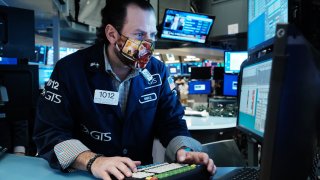
- Shares in Asia-Pacific fell on Thursday, following in the footsteps of the U.S. overnight.
- The tech-heavy Nasdaq dropped more than 3% to notch its biggest one-day loss since February, while the Dow Jones Industrial Average registered its first decline of 2022.
- European stocks slipped 1% on Thursday to extend the global slump.
LONDON — Global markets turned lower on Thursday as persistent inflationary pressure and fears of a faster-than-expected rise in U.S. interest rates weighed on riskier assets.
Shares in Asia-Pacific fell sharply on Thursday, following in the footsteps of the U.S. overnight. The tech-heavy Nasdaq dropped more than 3% to notch its biggest one-day loss since February, while the Dow Jones Industrial Average registered its first decline of 2022.
European stocks, meanwhile, slipped on Thursday to extend the global slump. The pan-European Stoxx 600 dropped around 1% during morning deals, with major bourses and almost all sectors in negative territory. Tech stocks led the losses, down around 2.8%, with German software company Nemetschek falling over 5%.
Get Boston local news, weather forecasts, lifestyle and entertainment stories to your inbox. Sign up for NBC Boston’s newsletters.
It comes at a time when market participants are already deeply concerned about the rapid global spread of the highly infectious omicron Covid variant, with several countries reporting record daily infections in the last 24 hours.
In Japan, the Nikkei 225 dipped roughly 2.9% as the dash to get out of tech stocks continued to hit high-profile companies. Japan's Sony Group fell 6.8%.
Australian stocks also saw heavy losses as the S&P/ASX 200 fell 2.7%. In mainland China, the Shanghai composite declined 0.25% while the Shenzhen component slipped 0.1%.
Money Report
MSCI's broadest index of Asia-Pacific shares outside Japan traded 1.3% lower.
'Lingering concerns' about the Fed
The losses come after minutes from the Federal Reserve's key December meeting were released on Wednesday. The summary showed the central bank discussed reducing its balance sheet in another move to aggressively dial back its pandemic-era easy monetary policy.
The Fed's plan to reduce the number of Treasurys and mortgage-backed securities it holds comes as it is already tapering its bond purchases and is set to hike interest rates after the taper concludes.
"We don't have any more information about what the Fed is thinking than we did several weeks ago," Brian Nick, chief investment strategist at Nuveen, told CNBC's "Squawk Box Europe" on Thursday.
"I think at that time what we understood was the Fed on average expected to raise rates three times in 2022, I don't think anything about that outlook has changed or they have gotten incrementally more hawkish since then. But I do think that maybe investors are, now that we are in the new year, focusing more on that," Nick said.
"We didn't see that much of a reaction after the meeting itself, we are seeing one now in terms of the steeper yield curve, a little bit of a stronger dollar but I think just lingering concerns about the Fed may be starting to move a little bit too quickly in shrinking its balance sheet and overtightening this year," he added.
"If those concerns creep in, and right now I think they are concerns, not alarm, you could see valuations pressured across the board in the equity market which would tend to favor lower valued, more cheaply valued companies."
The 10-year U.S. Treasury yield topped 1.7% following the release of the minutes. On Thursday, it was trading at 1.7387% around 6:20 a.m. ET. Yields move inversely to prices.
Bitcoin and other cryptocurrencies dropped on Thursday. Bitcoin was trading at just below $43,200 at 2:59 a.m. ET, down nearly 7% from the 24 hours previous, according to CoinDesk data. It fell as low as $42,503.88 in the last 24 hours, the lowest level in more than a month.
Other cryptocurrencies fell too. Ether dropped nearly 10% to $3,452.58
Elsewhere, oil prices reversed losses on Thursday morning. International benchmark Brent crude futures traded at $82.22 a barrel, up 1.7% for the session, while U.S. West Texas Intermediate futures stood at $79.30, around 1.9% higher.
— CNBC's Eustance Huang, Jeff Cox & Arjun Kharpal contributed to this report.






